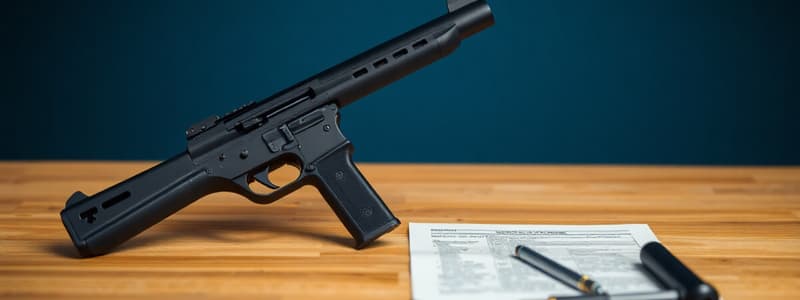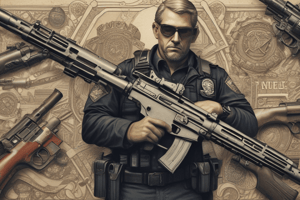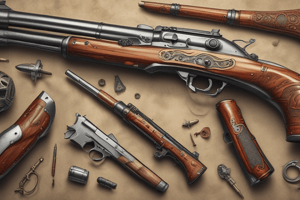Podcast
Questions and Answers
What must be done if firearms are modified according to the policy?
What must be done if firearms are modified according to the policy?
- No modifications of any kind are allowed.
- Only certified armourers can perform modifications without approval.
- Modifications require written approval from the Director General. (correct)
- They can be modified by any staff member.
What should occur if a firearm is discharged unintentionally?
What should occur if a firearm is discharged unintentionally?
- The police department must be notified immediately.
- The firearm can be immediately returned to service.
- No notification is required unless for training. (correct)
- An incident report should be completed as per CD 568-1.
Who is responsible for ensuring staff are properly trained and qualified to use firearms?
Who is responsible for ensuring staff are properly trained and qualified to use firearms?
- The correctional facility warden.
- The local police department.
- The Director of the Correctional Learning and Development Centre. (correct)
- The Assistant Deputy Commissioner.
What action is required for a firearm that has been used in an incident?
What action is required for a firearm that has been used in an incident?
Which document outlines the procedures for the safe control of firearms and ammunition?
Which document outlines the procedures for the safe control of firearms and ammunition?
What must occur before staff can use firearms in an emergency?
What must occur before staff can use firearms in an emergency?
In the event of a firearm being lost or unaccounted for, who must be informed?
In the event of a firearm being lost or unaccounted for, who must be informed?
What type of firearms are allowed for use within the institution?
What type of firearms are allowed for use within the institution?
Under what conditions can staff members transfer possession of firearms?
Under what conditions can staff members transfer possession of firearms?
Which of the following is considered a use of force involving a firearm?
Which of the following is considered a use of force involving a firearm?
What must staff do if they discharge a firearm for reasons other than training?
What must staff do if they discharge a firearm for reasons other than training?
When is it permissible to fire at a moving vehicle?
When is it permissible to fire at a moving vehicle?
What must occur before a warning shot is fired?
What must occur before a warning shot is fired?
What constitutes a proper reason to discharge a firearm to summon assistance?
What constitutes a proper reason to discharge a firearm to summon assistance?
What must be documented when accessing the firearms storage area?
What must be documented when accessing the firearms storage area?
In which situation can staff fire at an escapee using a helicopter?
In which situation can staff fire at an escapee using a helicopter?
What must be done with stored firearms?
What must be done with stored firearms?
How should firearms be transported according to the policy?
How should firearms be transported according to the policy?
What action must be taken if an aimed shot is fired at an individual?
What action must be taken if an aimed shot is fired at an individual?
What does the Criminal Code section 25 allow regarding the use of force?
What does the Criminal Code section 25 allow regarding the use of force?
What must be completed to document the supply or exchange of a firearm?
What must be completed to document the supply or exchange of a firearm?
Which of the following actions are prohibited with firearms?
Which of the following actions are prohibited with firearms?
Flashcards
Standing Orders
Standing Orders
A formal document outlining rules, procedures, and responsibilities for handling firearms within the institution.
Threat Risk Assessment
Threat Risk Assessment
An assessment conducted to determine the level of risk associated with transporting firearms and ammunition, considering potential threats and safety measures.
Change-over Procedures
Change-over Procedures
A process where trained individuals take over the responsibility for handling firearms and ammunition.
Standards for the Deployment of Firearms and Security Equipment
Standards for the Deployment of Firearms and Security Equipment
Signup and view all the flashcards
National Training Standards
National Training Standards
Signup and view all the flashcards
Security Equipment Manual
Security Equipment Manual
Signup and view all the flashcards
Certified Armourer
Certified Armourer
Signup and view all the flashcards
CD 568-1 - Reporting and Recording of Security Incidents
CD 568-1 - Reporting and Recording of Security Incidents
Signup and view all the flashcards
When can staff transfer firearm possession?
When can staff transfer firearm possession?
Signup and view all the flashcards
What actions constitute a use of force with a firearm?
What actions constitute a use of force with a firearm?
Signup and view all the flashcards
What are the procedures for staff who discharge a firearm, excluding authorized training?
What are the procedures for staff who discharge a firearm, excluding authorized training?
Signup and view all the flashcards
When is firing a firearm from a moving vehicle permitted?
When is firing a firearm from a moving vehicle permitted?
Signup and view all the flashcards
When is firing at a moving vehicle or aircraft permitted?
When is firing at a moving vehicle or aircraft permitted?
Signup and view all the flashcards
When can firearms be discharged for reasons other than preventing death or grievous bodily harm?
When can firearms be discharged for reasons other than preventing death or grievous bodily harm?
Signup and view all the flashcards
When is a warning shot permitted?
When is a warning shot permitted?
Signup and view all the flashcards
When is an aimed shot at an individual permitted?
When is an aimed shot at an individual permitted?
Signup and view all the flashcards
What criteria do inmates in medium, maximum, or multi-level security institutions meet for aimed shots to prevent escapes?
What criteria do inmates in medium, maximum, or multi-level security institutions meet for aimed shots to prevent escapes?
Signup and view all the flashcards
What measures can staff use to prevent an escape involving a helicopter or aircraft?
What measures can staff use to prevent an escape involving a helicopter or aircraft?
Signup and view all the flashcards
What measures can staff use to prevent perimeter breaches during attacks?
What measures can staff use to prevent perimeter breaches during attacks?
Signup and view all the flashcards
How are firearms and ammunition stored?
How are firearms and ammunition stored?
Signup and view all the flashcards
What requirements are there for entering the firearms and ammunition storage area?
What requirements are there for entering the firearms and ammunition storage area?
Signup and view all the flashcards
When is transporting a firearm in a Correctional Service of Canada vehicle permitted?
When is transporting a firearm in a Correctional Service of Canada vehicle permitted?
Signup and view all the flashcards
What are the requirements for transporting a firearm?
What are the requirements for transporting a firearm?
Signup and view all the flashcards
Study Notes
Firearms Policy and Procedures
-
Staff Training and Qualification: All staff issued firearms or assigned to armed posts must be trained and qualified according to National Training Standards.
-
Firearm Modifications: Modifications to firearms are only permitted with Director General, Security approval and by a certified armourer.
-
Firearm Deployment: Firearms are deployed according to the Standards for the Deployment of Firearms and Security Equipment, and use of only approved firearms and ammunition. Deviations require written approval from the Director General, Security.
-
Incident Reporting: Reporting procedures must be followed whenever a firearm is discharged (other than accidentally or for training); this includes notifying the police department immediately.
Reporting and Record-Keeping
-
Incident Reporting: Incidents involving modified, damaged, lost, or unaccounted-for firearms must be reported to the Assistant Deputy Commissioner, Integrated Services.
-
Firearm Discharges: Reporting for firearm discharges (other than training) follows CD 568-1. The Correctional Manager (Duty Desk) must be immediately advised, and firearms surrendered to the correct personnel following CD 568-4.
Standing Orders
-
Change-over Procedures: Standing Orders outline procedures for firearm and ammunition transfers.
-
Threat Risk Assessments: Threat Risk Assessment is required when an armed escort is necessary for firearms and ammunition.
-
Removal from Service: Procedures for removing firearms following use pursuant to CD 568-4 - Preservation of Crime Scenes and Evidence, are outlined.
Firearm Use and Force
-
Qualified Staff: Staff required to use firearms in their job will qualify in the use of the specific firearms utilized at their institution, according to the National Training Standards.
-
Firearm Transfers: Staff will not transfer firearms unless in life-threatening situations, incapacitated, for training, or as outlined in documentation for changeovers or external assignments approved by the Institutional Head.
-
Use of Force Definition: Pointing a firearm, displaying it as force, discharging a warning shot, and discharging an aimed shot are all considered uses of force.
-
Engagement and Intervention Model: Staff will respond to incidents according to engagement & Intervention model, CD 567 and CD 600.
-
Limitations: No firearm may be fired from a moving vehicle unless risks of not firing are higher than firing; firing at a moving vehicle or aircraft is only permitted under fire if the risks of not responding are higher than responding.
-
Additional Discharge Scenarios: Firearms may be discharged to summon assistance, or to destroy a dangerous/cruel-situation animal. Verbal warnings must precede warning shots. Emergency use is considered for situations like preventing death, serious injury and escapes within secured institutions.
-
Criminal Code Limitations: Section 25 of the Criminal Code allows for aimed shots to prevent grievous bodily harm or death when lesser means have failed. Staff can reasonably assume inmate behaviour in medium/maximum/multi-level security institutions. This includes escaping when lesser means are not available or are not the safest. Use of force to prevent escape from a helicopter is also allowed.
-
Perimeter Security: Staff may use force, including firearms, to prevent breaches of perimeter security, to stop attacks.
Storage and Transportation
- Safe Storage: Firearms must be unloaded and stored in secure containers made for firearms storage (vaults, safes, etc.).
- Ammunition Storage: Ammunition should not be stored near firearms unless otherwise approved.
- Access Control: Entry to firearms/ammunition storage areas is controlled, with documentation required for all entries noting reason, items, and authorizer.
- Transport Policies: Staff can be authorized, in writing, to transport firearms in CSC vehicles, in predetermined ways and situations (training, maintenance or supplying/exchanging).
- Transportation Security: Transported firearms must be unloaded, secured mechanically, or in a locked, opaque container strong enough to prevent opening during transport. The transportation container can be left in secured vehicle compartments.
Maintenance
- Maintenance: Only trained and assigned staff can perform firearm cleaning and maintenance. Any other repairs or modifications require Director General, Security approval.
Studying That Suits You
Use AI to generate personalized quizzes and flashcards to suit your learning preferences.




